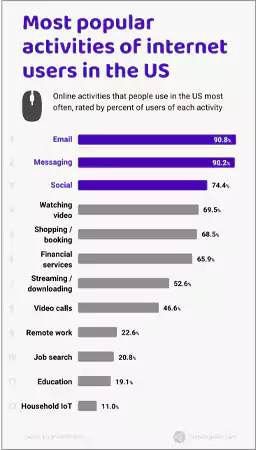Best Questions to Ask When Choosing an Internet Plan

Choosing an Internet plan is now as basic as deciding where to live or what car to drive. It’s a choice that can significantly affect your daily life, productivity, and even entertainment.
Of course, with many choices in the market, it can be challenging to adopt which one suits your household best.
Unfortunately, several users fail to assess their needs and the plans available, leading to dissatisfaction and, often, wasted money.
With the right set of questions and a clear understanding of your requirements, you can make a decision that aligns perfectly with your specific requirements and preferences. Let’s start.
DID YOU KNOW:- There are over 5.47 billion active internet users around the globe.
Best Questions to Ask
No matter if you’re planning to invest in a new Wi-Fi connection or to switch from your old connection to a new one, there are a lot of considerable questions that must be asked of the broadband provider and yourself. That’s why we have gathered the 10 most important Qs to help you figure out the best connection for your requirements.
- What are my internet needs?
Before diving into various plans, take a moment to assess your needs. Do you primarily use an online network for casual browsing, or do you want it for bandwidth-intensive activities like gaming and 4K streaming? Understanding your usage patterns is the first step in looking for the right plan.
- What type of internet connection is available in my area?
The type of connection available can vary depending on your location. Your common options will likely include DSL, cable, fiber-optic, and satellite internet. So, make sure to do your research on which types are accessible in your area to narrow down your choices.
- What is the download and upload speed?
The internet speed considerations for remote workers is also a dealbreaker when investing in an internet connection. If you’re a heavy user, you’ll want a scheme with faster download and upload speeds, like fiber internet. But if you’re a light user, a more affordable plan with slower speeds might suffice.

- Is there a data cap?
Some plans come with data caps, meaning there’s a limit to the amount of input you can use each month. If your household usually streams 4K movies and TV series or plays data-heavy games, it’s best to look for online network connections with unlimited data. Don’t be afraid to inquire about data caps and consider if they align with your usage habits.
- What are the pricing and contract terms?
Understanding the costs associated with your deal is fundamental. Ask different internet providers about the monthly fees, installation charges, and any promotional rates that may expire. And if the check is there’s a contract, and if so, what are the terms for cancellation or changes?
- Are there any bundling options?
Several service providers offer bundle deals that include TV, phone, and internet assistance. Bundling can help you save money in the long run, but only if the bundled services align with your needs. You should consider if you really require all the bundled services, or if a standalone network plan better suits your requirements.
- What is their reputation for customer service?
Quality customer assistance can make a significant difference when you encounter issues with your internet connection. Research customer reviews and ratings for your chosen service provider. A provider with a strong reputation for excellent customer service is more likely to address your issues and concerns promptly.
- Is technical support available 24/7?
Network-related problems can happen at any time, and you’ll want timely assistance when they do. Find out if the provider offers 24/7 technical support for troubleshooting internet connection problems whenever they occur, even in the middle of the night or on weekends.
- Are there any additional fees or hidden costs?
Transparency is key when opting for a new deal. Always ask about any additional fees or hidden costs that might not be explicitly mentioned in the scheme details. Understanding the complete cost will help you avoid future surprises on your bill and maintain control over your budget.
- What’s the average peak hour speed?
Speeds can vary depending on the time of day, with peak hours often experiencing slower connections. Ask your provider about the average speeds during peak usage times to gauge how well the plan will perform when you require it most.
Fun Fact:– There are on average 26 smart objects located near every human on Earth.
The Bottom Line
Choosing your internet plan is like picking the right tool for a job. These questions help you make sure it fits your needs. So, go ahead and select your deal with confidence following this guide, and you will surely have a better online experience.








